24 Oct 2016 | Malaysia, News and features
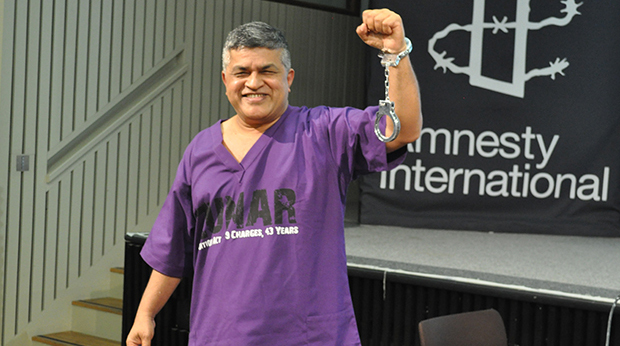
Award-winning Malaysian cartoonist Zunar, who faces up to 43 years imprisonment for tweeting his cartoons criticising his country’s leaders reported on 17 October that he has had a travel ban imposed blocking him from travelling outside the country.
Zulkiflee Anwar Ulhaque, known as Zunar, has faced harassment from the Malaysian government for his political cartoons. Five of his books have been banned in Malaysia and his office has been raided several times, resulting in the confiscation of thousands of his books.
The Malaysian government has banned his books on the grounds that they can “influence the public to revolt against the leaders and government policies” and they are “detrimental to public order.”
Any bookstore, vendor, printer or publisher who agrees to sell the cartoonist’s books also face harassment from the Malaysian government, receiving threats of having their business licenses revoked or their offices raided. Zunar’s books are now printed without the name of the publisher to protect them. Although this is against the law, he has no choice if he wishes to continue publication of his cartoons.
Zunar is being charged under the Sedition Act, which was originally put in place in 1948 to curb opposition to British colonial rule, but the law has remained part of Malaysia’s legal system. The Sedition Act prohibits any behavior that could be deemed detrimental to the government. This outdated law allows the Malaysian government to censor opposition.
His cartoons have covered a wide range of controversial topics in Malaysia, from unsolved murders to political conspiracies. His motto is proudly displayed throughout his website, “How Can I Be Neutral, Even My Pen Has a Stand” emphasising his unfaltering mindset to stand up to the Malaysian government.
Zunar has challenged the Sedition Act and the Malaysian government multiple times in the past. First in 2010 to fight the banning of his books in the country, then in 2011 against the government and police for unlawful arrest and detention. Unfortunately in both cases the courts ruled against him.
Now with a travel ban placed on him by the Malaysian government, Zunar plans to again file a suit to challenge its validity. The cartoonist discovered the ban on 17 October 2016 at the Kuala Lumpur International Airport, though it has been effective since 24 June 2016.
With the court proceedings for Zunar set for 22 November, he faces a maximum of 43 years in prison for tweeting his cartoons. The cartoonist has been imprisoned twice in the past; once for two days in 2010 and again for three days in 2015, both times for violating the Sedition Act. Three of Zunar’s assistants were also arrested in 2014 for selling his cartoons.
Zunar is currently out on bail but is stuck in Malaysia with the threat of 43 years imprisonment ahead of him. Despite this, he remains dedicated to exposing the corruption of the government, stating in an interview with Index on Censorship in 2015, “I will never stop, it is my right as a citizen to express my view and my responsibility as a cartoonist to give alternative views.”
4 May 2016 | Asia and Pacific, Malaysia, mobile, News and features
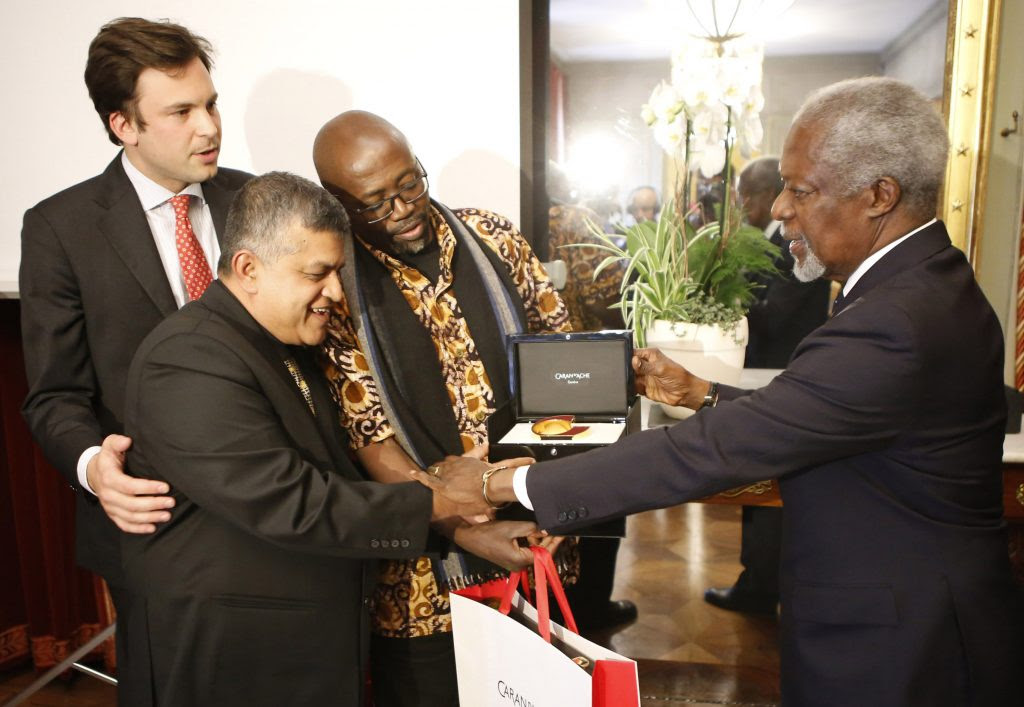
Zunar receiving the award from Kofi Annan, secretary-general of the United Nations, at the Palais Eynard, Geneva
Malaysian cartoonist Zulkiflee Anwar Haque, aka Zunar, has won the 2016 Cartooning for Peace Prize.
The award was presented at a ceremony at the Palais Eynard in Geneva on Monday 3 May 2016 by the honorary president of the Swiss Foundation Cartooning for Peace and former secretary-general of the United Nations Kofi Annan.
Annan said the award — jointly won by Kenyan cartoonist Gado — “reminds us how fragile this liberty remains in Africa and in Asia as well as in other regions of the world”.
“Through their commitment towards open and transparent societies, Gado and Zunar, who have received threats in their countries of origin and can no longer practice their profession, confront us with our responsibility to preserve freedom of expression and act in order to support the combat of those who cannot express themselves through their art,” Annan added.
Zunar has been repeatedly targeted with arrest, detention and harassment for his cartoons which are critical of corruption and abuses of power committed by the Malaysian government. He is currently facing nine charges of sedition for criticising Malaysia’s judiciary over the recent incarceration of a Malaysian opposition leader and faces a possible 43 years in prison if found guilty.
The cartoonist said the Cartooning for Peace Prize gives him “strength for me to continue the fight against the 60-year old corrupt and repressive Malaysian regime”.
He said human rights and freedom of expression are in “dire straits” in Malaysia and the country’s institutions and draconian laws such as the Sedition Act are routinely used as a tool to “silence critics” and “maintain power”.
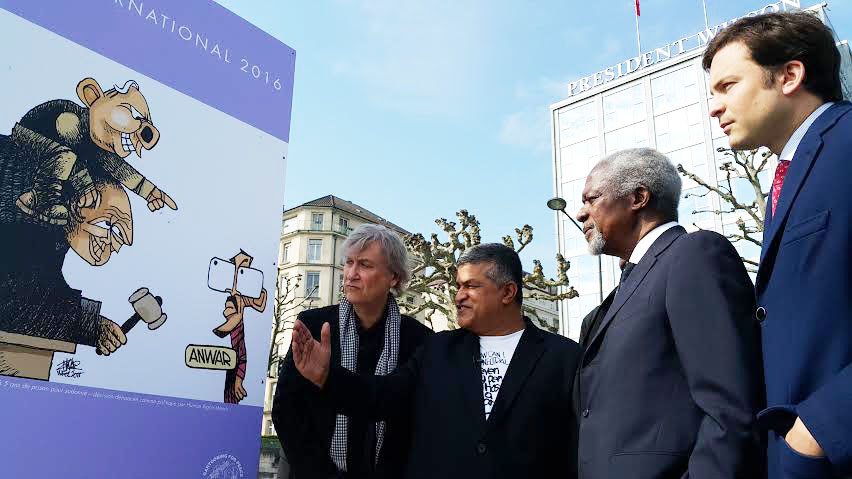
“Talent is not a gift, but a responsibility,” Zunar added. “It is a duty for me as a cartoonist to use the art as a weapon to fight unjust rulers. Fear and intimidation are the potent tools being used by the regime to scare the people.”
“I also strongly believe that, when faced with a moral crisis, there is no room to grumble in silence. We have to stand up and cry our voice out loud and clear. Neutrality is escapism for those who live in a comfort zone.”
Zunar has spent two periods in Malaysian jails, firstly in September 2010 and again from 10 February 2015. Several of his books have been banned while bookstores carrying his works have been raided and three of his assistants were arrested in October 2014 for selling his books. The webmaster, who manages his website and online bookstore, has been interrogated by Malaysian police.
Zunar has previously been awarded the 2011 Courage in Editorial Cartooning Award by Cartoonists Right Network International, the 2011 and 2015 Human Rights Watch Hellman/Hammett Award, and the 2015 International Press Freedom Award by the Committee to Protect Journalist.
Zunar received a standing ovation at Index on Censorship’s Freedom of Expression Awards in London in April.

Zulkiflee Anwar Haque, aka “Zunar”, upper right, is saluted by the audience. (Photo: Elina Kansikas for Index on Censorship)
11 Dec 2015 | Asia and Pacific, Campaigns, Malaysia, mobile, Statements
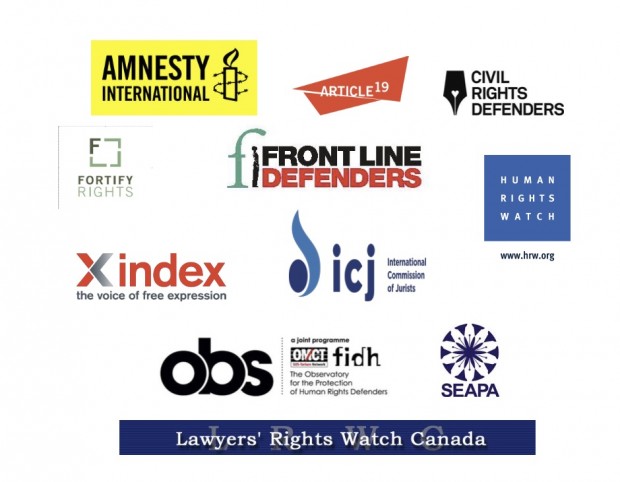
Dear Attorney General Mohamed Apandi Ali,
We write to you as organisations that are deeply concerned by the decision of the Malaysian authorities to prosecute Lena Hendry for her involvement in the screening of the award-winning human rights documentary, “No Fire Zone: The Killing Fields of Sri Lanka,” in Kuala Lumpur on July 9, 2013. The charges against her violate Malaysia’s obligations to respect the rights to freedom of opinion and expression, notably to receive and impart information. We respectfully urge you to drop the charges against Hendry. Her trial in Magistrate Court 6 in Kuala Lumpur is slated to begin on December 14, 2015.
As you know, Hendry is being charged under section 6 of the Film Censorship Act 2002, which imposes a mandatory prior censorship or licensing scheme on all films before they can be screened at any event, except films sponsored by the federal government or any state government. If convicted, she faces up to three years in prison and a fine up to RM 30,000.
The prosecution appears intended to restrict the activities of Hendry and members of the KOMAS, the human rights education and promotion organisation with which she works, by hindering their efforts to provide information and share their perspectives on human rights issues.
International human rights law and standards, such as found in article 19 of the Universal Declaration of Human Rights, states that “everyone has the right to freedom of opinion and expression; this right includes freedom to hold opinions without interference and to seek, receive, and impart information and ideas through any media and regardless of frontiers.”
Malaysia has committed to ensuring that all human rights defenders are able to carry out their activities without any hindrance or fear of reprisals from the government. In November, Malaysia voted in favor of a resolution on “Recognizing the role of human rights defenders and the need for their protection” in the 3rd Committee of the United Nations General Assembly. The resolution set out the urgent need for governments to protect human rights defenders worldwide. Article 1 of the UN Declaration on Human Rights Defenders, adopted unanimously by the UN General Assembly on December 9, 1998, states that “everyone has the right, individually and in association with others, to promote and to strive for the protection and realization of human rights and fundamental freedoms at the national and international levels.” Article 12(2) provides that the government shall “take all necessary measures to ensure the protection by the competent authorities of everyone, individually and in association with others, against any violence, threats, retaliation, de facto or de jure adverse discrimination, pressure or any other arbitrary action as a consequence of his or her legitimate exercise of his or her rights.”
In addition to dropping the charges against Hendry, we also urge you, as attorney general, to seek to repeal provisions of the Film Censorship Act 2002 that allow unnecessary and arbitrary government interference in the showing of films in Malaysia. This policy denies Malaysians the opportunity to benefit from a range of viewpoints on issues of importance to Malaysian society and that affect Malaysia’s role in the world.
Sincerely,
Brad Adams
Director, Asia Division
Human Rights Watch
Gail Davidson
Executive Director
Lawyers’ Rights Watch Canada
Jodie Ginsberg
Chief Executive
Index on Censorship
Karim Lahidji
President
International Federation for Human Rights (FIDH)
Mary Lawlor
Director
Front Line Defenders
Edgardo Legaspi
Executive Director
Southeast Asian Press Alliance (SEAPA)
Marie Manson
Program Director for Human Rights Defenders at Risk
Civil Rights Defenders
Champa Patel
Interim Director, South East Asia and Pacific Regional Office
Amnesty International
Amy Smith
Executive Director
Fortify Rights
Oliver Spencer
Head of Asia
Article 19
Gerald Staberock
Secretary General
World Organization Against Torture (OMCT)
Sam Zarifi
Regional Director for Asia and the Pacific
International Commission of Jurists
Cc:
Ahmad Zahid Hamidi, Minister of Home Affairs
Joseph Y. Yun, Ambassador of the United States of America to Malaysia
Luc Vandebon, Ambassador of the European Union to Malaysia
Victoria Treadell, British High Commissioner to Malaysia
Christophe Penot, Ambassador of France to Malaysia
Holger Michael, Ambassador of Germany to Malaysia
Rod Smith, Australian High Commissioner to Malaysia
Judith St. George Canadian High Commissioner to Malaysia
Dr John Subritzky, New Zealand High Commissioner to Malaysia
Ibrahim Sahib, Sri Lanka High Commissioner to Malaysia
25 Nov 2015 | Asia and Pacific, Malaysia, mobile, News and features
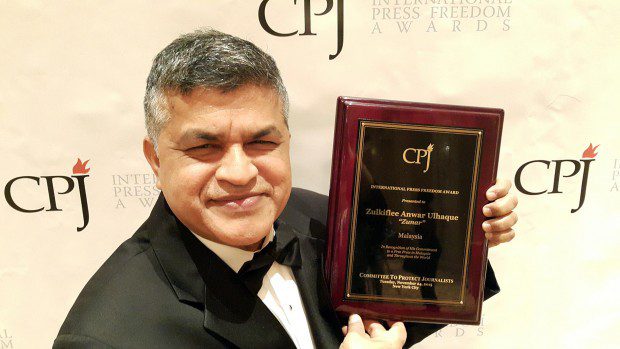
Zunar with his International Press Freedom Award
Malaysian cartoonist Zunar has won the International Press Freedom Award 2015 from the Committee to Protect Journalists (CPJ).
The political cartoonist, who uses his work to expose abuses of power and corruption in Malaysia, was presented the award yesterday evening at a gala dinner at The Waldorf Astoria, New York.
In his acceptance speech, Zunar dedicated the award to “the Malaysians who have equally pushed for reform”. He also took the opportunity to criticise the Malaysian government: “It is both my responsibility and my right as a citizen to expose corruption, wrong-doing and injustices. Laws like the Sedition Act mean that drawing cartoons is a crime.”
“The government of Malaysia is a cartoon government; a government of the cartoon, by the cartoon, for the cartoon — sorry Abraham Lincoln,” Zunar joked. “For asking people to laugh at the government, I was handcuffed, detained, thrown into the lock-up. But I kept laughing and encouraging people to laugh with me. Why? Because laughter is the best form of protest.”
Zunar currently faces 43 years in prison on nine separate charges of sedition for tweets he wrote criticising Malaysia’s judiciary over the incarceration of a Malaysian opposition leader. His court case was due to begin on 6 November. However, the cartoonist and his lawyers applied to have the case referred to the High Court, delaying proceedings. The application is set for a hearing on 8 December.
The threat of imprisonment obviously hasn’t deterred him from continuing with his work. “My mission is to fight through cartoons,” Zunar said. “Why pinch when you can punch? People need to know the truth and I will continue to fight through my cartoons. I want to give a clear message to the aggressors — they can ban my cartoons, they can ban my books, but they cannot ban my mind.”
Four of Zunar’s most celebrated cartoons are on display at London’s Cartoon Museum until January.
This article was posted on 25 November 2015 at indexoncensorship.org






